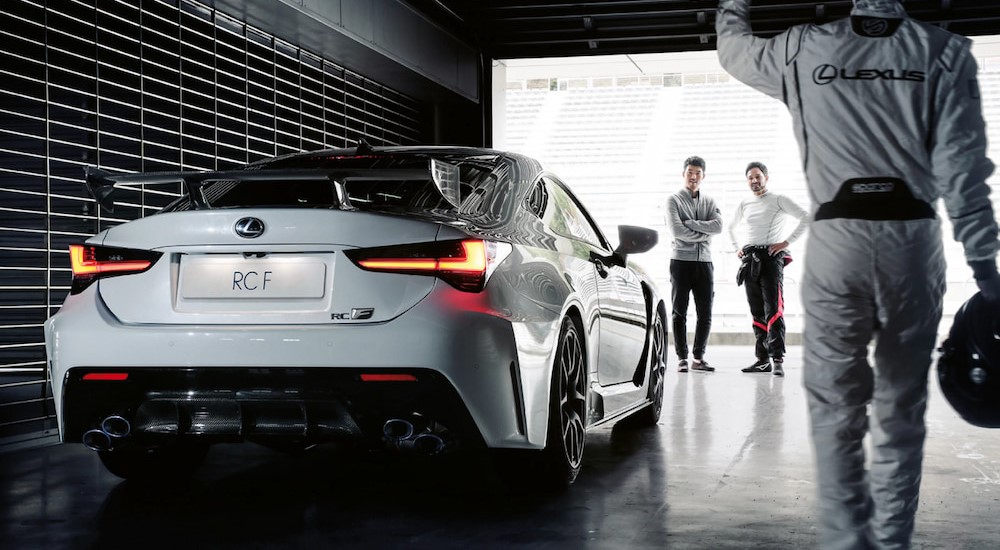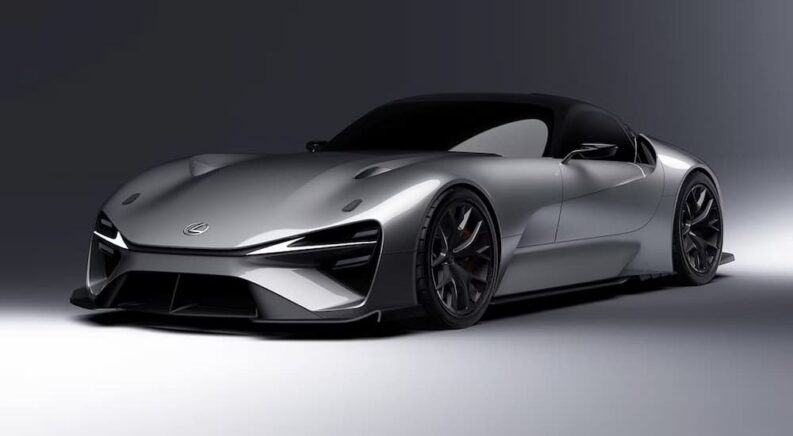When it comes to high-performance cars, Lexus is a brand of paradox. Most of the time, it focuses on its bread-and-butter crossovers and sedans, but just when you think the brand has given up on enthusiast cars, your Lexus dealer will have something like the LFA or the RC F, or even the new GX Overtrail if you are more into off-roading than spending time at the track. While Lexus doesn’t have the enthusiast hype in the same way that German luxury brands do, there is no arguing that it knows how to build some amazing machines.
Right now, Lexus is in one of its slumps. The IS 500 stirred up its share of excitement when it was introduced in 2022, and all three of the Lexus V8 cars remain simply incredible expressions of old-school high-displacement power in absolutely bulletproof bodies, but the brand’s enthusiast offerings are all rather long in the tooth. The LC is the youngest at seven years old, the RC is about to celebrate its 10th birthday, and the current generation of the IS debuted all the way back in 2014! However, this just means it’s about time for Lexus to pull off something unexpected and reveal some exciting new cars in the upcoming years.
A New Lexus Sports Sedan
Given that it’s the oldest rear-wheel drive platform in the Lexus lineup, it makes sense that the IS is most desperately in need of replacement. Plus, being a sedan, it has more sales potential than a new two-door model. So it’s no surprise that a new IS is in the works and will likely arrive rather soon. While there aren’t officially any details of what this new car will look like or even if it will keep the IS name, Toyota recently released a video of what is almost certainly the new IS in testing.
Buried in a half-hour Toyota Times segment on the new family of gasoline engines that the brand is developing is a brief section showing two Toyota employees testing the new engine in a blurred-out “secret” sedan at the famed Fuji Speedway. If you aren’t a hardcore Lexus fan, then it’s worth noting that the Lexus F performance brand takes its name from this Japanese racetrack because Fuji Speedway is where it develops its performance models.
Although it’s difficult to tell much about the secret vehicle, given that it’s a gutted development prototype, all signs point to it being the next IS. The new powertrain being tested is a small-displacement hybrid that appears to display above-average acceleration, although it is difficult to make any meaningful guess at what that means in hard numbers. The smaller displacement could indicate that this is a lower-trim model, but modern manufacturers are getting extreme horsepower numbers out of small engines, with the new Mercedes-AMG C 63 S getting no less than 671 hp and 752 lb-ft out of a similar 2.0L turbo-hybrid setup.
Will the new IS be this powerful? Probably not, but it goes to show that even if the V8 is discontinued, the next generation of Lexus’ compact sports sedan probably won’t be lacking power. We can probably also expect this car to arrive relatively soon. This IS needs a replacement and the presence of a prototype that needed to be blurred out rather than a simple test mule makes it look like the new generation might only be a year or two out. But this is just the first, and arguably the least interesting, of what Lexus has in the pipeline.

A Sports Coupe Built for the Track
The Lexus RC might not be the fastest car around by modern standards, but it still holds its own. More importantly, it serves as the starting point for real-deal race cars in several high-profile motorsports series. Most recently, the Lexus RC F LMGT3 participated in the 24 Hours of Le Mans for the first time, scoring a respectable seventh-place class finish. In order to boost its racing results, Lexus has determined that its next-generation RC needs to emphasize track performance and has been developing the new car accordingly.
While there are still few official details about the road car, Toyota Racing Development has announced that a new GT3 car will be unveiled for the 2026 season, and a prototype called the “GR GT3 Concept” was displayed during the 2022 Tokyo Auto Salon. Reporters have also taken many spy shots of camouflaged prototypes being tested at the Fuji Speedway and Mobility Resort Motegi racetracks. Developing the race car first rather than modifying an existing road car is a new move for Lexus that promises to deliver a very exciting product when it finally reaches Lexus dealers.
Not much is known about the specifications of this vehicle, although remedying the high weight of the RC F was identified as one of the key goals of the new car. However, some of the spy videos reveal the unmistakable sound of a Toyota V8 engine. It’s possible that the production version will offer a different power plant, such as a turbocharged V6 or even a hybrid, but either way, this is shaping up to be one of the highest-performance vehicles that Lexus has ever sold and should remain reasonably attainable even if it will likely cost more than the current RC.
Putting a Halo on the Lineup
This final model is the most speculative. While we have seen development prototypes for the IS and RC replacements, the brand’s future halo model has only been displayed as a concept car unveiled at the 2022 Goodwood Festival of Speed. The “Lexus Electrified Sport” is intended not just as a replacement for the LC but as a spiritual successor to the legendary LFA. Although it trades the screaming V10 for an all-electric powertrain, this would be the most powerful Lexus model ever, with an estimated 0-60 mph time of around two seconds.
Unlike some of the wilder Lexus EV concepts, this car looks a lot like any other front-engine supercar, although it certainly has a futuristic vibe to it. The real technical innovation comes from the use of solid-state batteries. Lexus claims that they could give this car a range of 430 miles, but the real benefit of solid-state batteries is their much lower weight compared to current lithium-ion batteries. Existing EV models are already extremely fast, but the problem is their excessively high weight, which harms handling and braking performance. Solid-state batteries promise to solve that.
However, solid-state batteries are also the stumbling block as they have yet to be demonstrated at a commercially viable level. Toyota has invested billions of dollars developing the technology, but currently estimates that it won’t be available until at least 2027. Hopefully, the timeline doesn’t slip further to the right and we can enjoy seeing a new electric halo car for the Lexus lineup before 2030, but don’t hold your breath just yet.
A New Era for Lexus Is Almost Here
It’s time for Lexus to revitalize its performance lineup, and these three models would do exactly that. While we will miss the V8 era when the current IS, RC, and LC retire over the coming years, there is a lot to look forward to––and we may even see the V8 continue its reign under the hood of the RC replacement! From the hybrid power of the IS replacement to the solid-state batteries of the Lexus Electrified Sport, Lexus is pursuing several paths into the future and will soon have an enticing option for a range of driver preferences.




